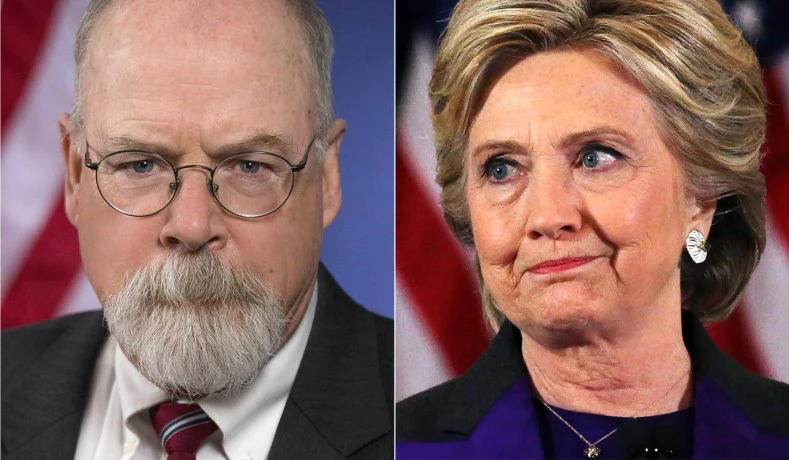by KANE
SOURCE — Kim Strassel WSJ
Special Counsel John Durham steps into court Monday with the first trial of his probe into Democrats’ Russia-collusion hoax.
That’s a formality. Mr. Durham has already won.
Perkins Coie lawyer Michael Sussmann stands accused of lying to the
Federal Bureau of Investigation by claiming the dirt on Donald Trump he
fed to the FBI wasn’t delivered on behalf of “any client.” Mr. Sussmann
was in the pay of the Hillary Clinton campaign and Democratic National
Committee and worked extensively with outside players and the media to
produce the collusion narrative as well as documents that stoked FBI
probes of Mr. Trump’s 2016 campaign, according to Durham filings. Mr.
Sussmann has pleaded not guilty.
Commentators spent last week warring over whether Judge Christopher
Cooper’s rulings on the use of evidence would help or hinder Mr.
Durham’s case. It doesn’t much matter. Mr. Durham has already
accomplished his far bigger goal with this narrow indictment. He’s put
every sleazy collusion player in the hot seat, with ramifications beyond
the courtroom.
From the day the special counsel released the 27-page Sussmann
indictment in September (and the follow-on charges against dossier
contributor Igor Danchenko), it’s been clear he had ambitions that went
far beyond a conviction for lying. Each of his filings follows the same,
deliberate strategy—lengthy briefs and long exhibits full of names,
emails and documents, all of which connect the dots and expose the web
that enabled this hoax, and the lies that kept it hidden.
Democratic superlawyer Marc Elias isn’t charged, but he also no
longer heads the elite political-law practice at Perkins Coie. The firm
last August announced Mr. Elias, who’d been there 28 years, was leaving
to start his own small practice. A few weeks later, the Sussmann
indictment laid bare the role Mr. Elias, a longtime DNC and Clinton
lawyer, played in ginning up and distributing the bogus Trump-Russia
claims.
Christopher Steele, author of the infamous dossier, once lauded by
the press as an international superspy, is now a man in search of a
reputation. His dossier’s “intelligence,” Mr. Durham’s documents show,
came primarily from a Brookings Institution employee, Mr. Danchenko, who
was recycling salacious chatter from a Clinton associate. Whatever work
Mr. Steele may find in future, it won’t include assisting the FBI or
any other respectable agency.
Fusion GPS, which hired Mr. Steele, has become toxic in Washington.
The Durham prosecutions show how the opposition-research firm
operates—not by producing real research, but by shopping seamy claims to
law enforcement, then browbeating journalists into covering the
“investigations” Fusion inspires. (Fusion in court filings says its job
was to help Perkins Coie with legal advice—a claim the judge largely
rejected Thursday.) The Washington press corps knows it got played—and
how. A recent Durham filing released dozens of emails showing reporters
at top outlets palling it up with their Fusion narrators, with one Slate
writer even sending a draft October 2016 article for Fusion to review.
Is the DNC going to hire Fusion anytime soon? Even credulous reporters
will think twice before running with another Fusion lead.
Mrs. Clinton won’t be in the courtroom, but the campaign’s claims it
was in the dark about the Perkins Coie and Fusion work are in ashes. Mr.
Durham’s evidence shows top Clinton aides—including campaign manager
Robby Mook—were apprised of allegations and helped circulate them. Also
among the circulators was current national security adviser Jake
Sullivan, who faces calls to resign given his role.
Then there’s James Comey’s FBI. One downside of the Durham “lying”
strategy is that it requires prosecutors to present the FBI as dupes of
the Clinton operation. Yet amusingly, this has lured the defense into
providing evidence of FBI rot. Mr. Sussmann’s lawyers will argue at
trial that their client can’t be found guilty of lying to the FBI, since
“they have reviewed more than 300 emails that show the bureau
understood Sussmann worked for Democratic campaign entities,” as the
Washington Post reports.
The FBI knew all along and ran with unvetted political dirt, even if
Mr. Sussmann’s alleged lie allowed it to pretend it was aboveboard. And
as the Durham evidence shows, it went on pretending, failing to follow
up on Mr. Steele, the dossier or its Clinton origins until long after
the election (at which point special counsel Robert Mueller failed to
follow up on the FBI for nearly two years more). Most of the FBI’s
former leaders have been fired or left, its reputation is in tatters,
and the GOP will dig further if it regains Congress this fall.
Many conservatives remain frustrated that Mr. Durham hasn’t pursued
far more sweeping conspiracy charges. But conspiracy cases are hard to
prove. A sweeping prosecution of high-name figures would cause a
political feeding frenzy, and be proclaimed by the media a partisan
exercise. A court loss would make it easier for the press to cast the
entire effort as debunked.
The narrow prosecution of the little-known Mr. Sussmann has allowed
for a focus on the bigger story. Stay tuned for a flood of more
information coming out of a trial that on its face is about one lawyer,
but in reality is the continuing tale of one of the dirtiest tricks in
modern U.S. history.
